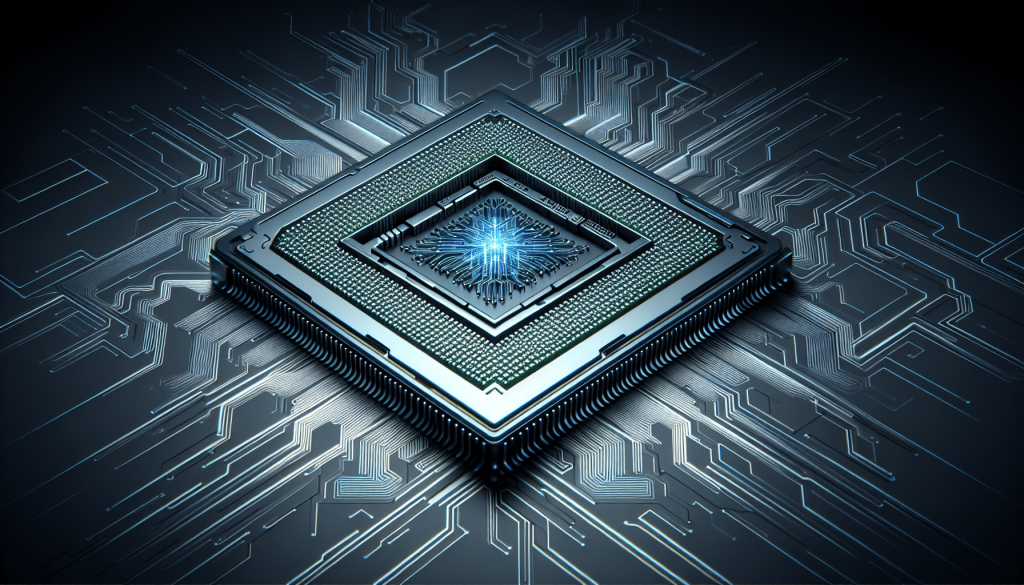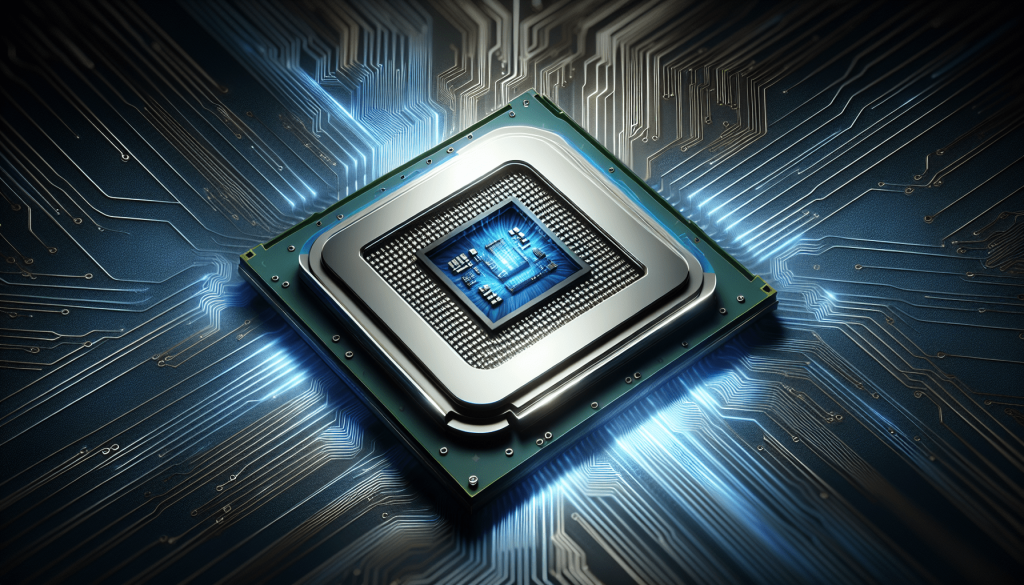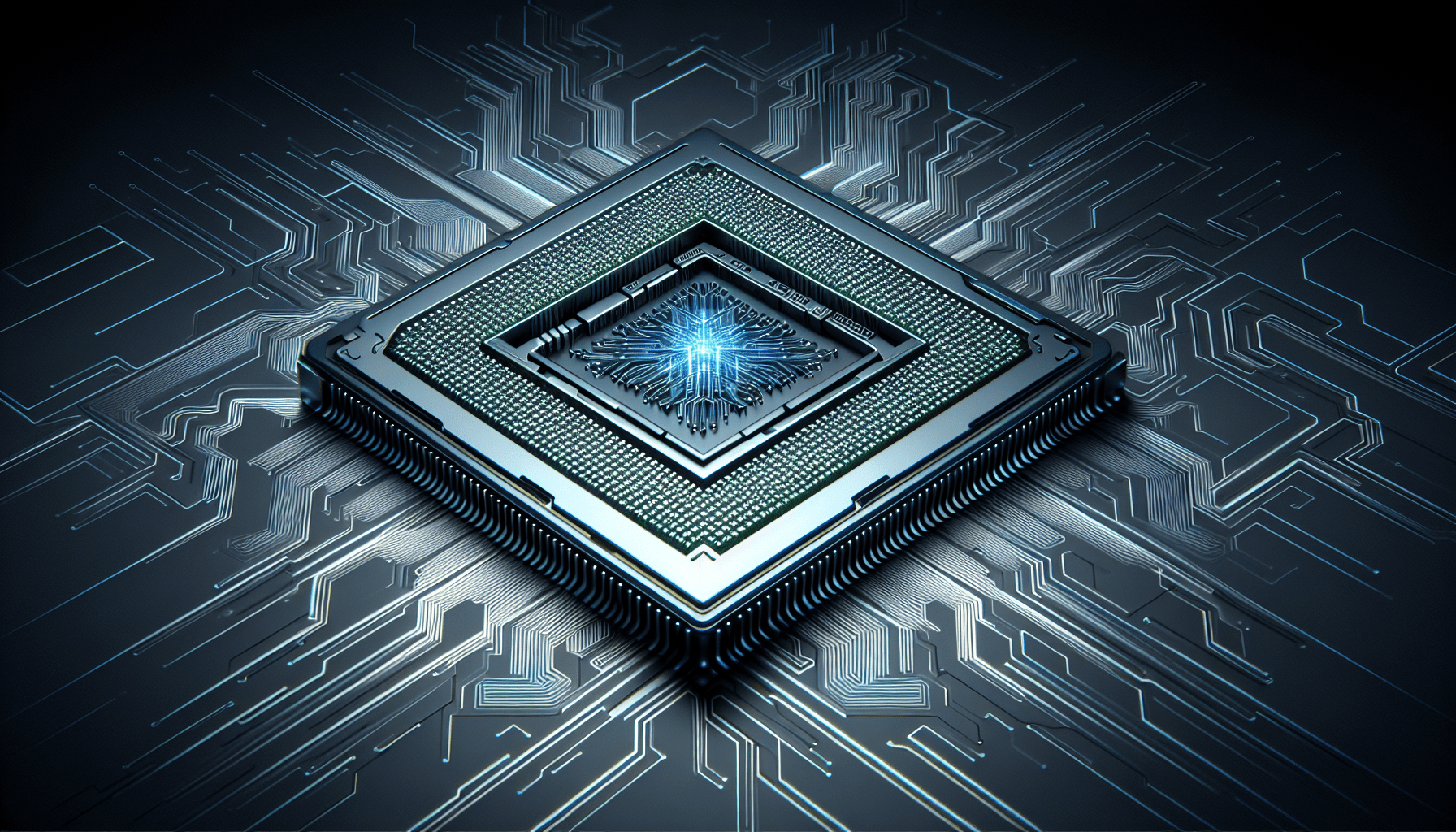
The Ultimate Guide to Overclocking Nvidia Graphics Cards with MSI Afterburner
February 19, 2024Have you heard the buzz about the Latest Generation of AMD Ryzen CPUs? These brand new processors from AMD are taking the tech world by storm with their impressive performance and cutting-edge features. Whether you’re a hardcore gamer, a content creator, or simply someone who needs a reliable and powerful computer, the new Ryzen CPUs are sure to exceed your expectations. From improved multitasking capabilities to enhanced graphics, these processors are designed to deliver an unparalleled computing experience. Get ready to unlock a new level of speed and efficiency with the Latest Generation of AMD Ryzen CPUs.

Overview of AMD Ryzen CPUs
Introduction to AMD Ryzen CPUs
AMD Ryzen CPUs are a family of high-performance processors designed and produced by Advanced Micro Devices (AMD). These CPUs have gained significant popularity and have become a strong competitor to Intel’s CPUs in recent years. AMD Ryzen CPUs are known for their excellent performance, affordability, and the innovative Zen architecture that powers them. Whether you are a gamer, content creator, or professional multitasker, AMD Ryzen CPUs offer a range of models to meet your needs.
Advantages of AMD Ryzen CPUs
One of the primary advantages of AMD Ryzen CPUs is their impressive multicore performance. The latest generation of Ryzen CPUs boasts a significant increase in core count, allowing for more simultaneous threads and improved multitasking capabilities. This increased core count also enhances productivity and performance in applications that can take advantage of multiple cores.
Another advantage of AMD Ryzen CPUs is their higher clock speeds compared to previous generations. This increased clock speed translates into faster single-core performance, benefiting tasks that rely heavily on single-threaded performance, such as gaming. Additionally, the Zen 3 architecture implemented in the latest Ryzen CPUs has improved power efficiency, resulting in reduced power consumption and lower heat generation.
Comparison to previous generation CPUs
Compared to their predecessors, AMD Ryzen CPUs offer substantial improvements in performance and efficiency. The Zen 3 architecture, which powers the latest Ryzen CPUs, delivers a significant boost in instructions per clock (IPC), resulting in improved overall performance. This architectural upgrade also introduces innovative features and optimizations that further enhance the CPU’s capabilities.
The Zen 3 architecture utilizes a unified complex infrastructure, effectively combining the cache and the core components. This design choice allows for more efficient data sharing and faster communication between different components, resulting in improved performance across a wide range of tasks. Additionally, the Zen 3 architecture enhances branch prediction capabilities, reducing the number of mispredicted branches and improving overall performance.
Ryzen CPU Architecture
Zen 3 architecture
The Zen 3 architecture is at the heart of the latest generation of AMD Ryzen CPUs. It builds upon the success of its predecessor, Zen 2, and introduces several advancements that further refine the architecture. Zen 3 utilizes a “chiplet” design, where multiple CPU cores are placed on individual chiplets and connected through a high-speed infinity fabric. This design allows for better power management, improved cache performance, and better scalability.
Improvements in performance and power efficiency
One of the significant improvements in the Zen 3 architecture is the increase in instructions per clock (IPC) compared to the previous Zen 2 architecture. This increase, coupled with higher clock speeds, results in overall improved CPU performance. Moreover, AMD has made additional optimizations to the cache structure, reducing latency and increasing efficiency.
The Zen 3 architecture also introduces better power management capabilities. With advancements in power gating techniques and refined voltage control, the latest Ryzen CPUs offer improved power efficiency and reduced power consumption. This results in cooler and quieter operation, making them an excellent choice for both high-performance desktops and small form factor systems.
Key features and innovations
The Zen 3 architecture brings several key features and innovations to the table. One noteworthy feature is the redesigned core layout, which introduces a more efficient and scalable complex infrastructure. The unified cache design in Zen 3 improves data sharing and reduces latency, leading to increased performance and responsiveness.
Another notable innovation is the use of AMD’s Precision Boost technology. Precision Boost dynamically adjusts clock speeds for each individual core, maximizing performance based on workload demands. This intelligent boost algorithm ensures that the CPU operates at peak efficiency, delivering the best possible performance in any given scenario.
Top Features of the Latest Generation
Increased core count
The latest generation of AMD Ryzen CPUs boasts a significant increase in core count compared to previous models. This increase allows for more simultaneous threads and improved multitasking capabilities. Whether you are rendering complex 3D graphics, streaming content, or running multiple virtual machines, the increased core count provides the necessary power to handle demanding workloads with ease.
Higher clock speeds
The Ryzen CPUs in the latest generation also feature higher clock speeds, making them even more capable in single-threaded tasks. The increased clock speeds translate into improved responsiveness and faster execution of applications that heavily rely on single-threaded performance, such as gaming. With higher clock speeds, you can enjoy smoother gameplay, reduced input lag, and faster load times.
Enhanced cache and memory support
AMD has enhanced the cache and memory support in the latest Ryzen CPUs. These improvements result in reduced latency, improved data access speeds, and enhanced overall system performance. The larger cache sizes ensure that frequently accessed data is readily available, reducing the need to fetch data from external sources, which can significantly improve performance in various applications.
Improved overclocking capabilities
Overclocking is the process of running a CPU at a higher frequency than its stock specifications. The latest generation of AMD Ryzen CPUs exhibits improved overclocking capabilities that allow enthusiasts to push their CPUs to higher clock speeds. This increased headroom for overclocking enables users to extract even more performance from their Ryzen CPUs, making them an excellent choice for users who enjoy tinkering with their hardware for maximum performance gains.

Product Lineup
Introduction to the latest Ryzen CPU models
AMD offers a diverse range of Ryzen CPU models in its latest lineup, catering to different needs and budgets. From entry-level models aimed at budget-conscious users to high-end models designed for power users and enthusiasts, there is a Ryzen CPU for everyone. The latest generation includes models such as the Ryzen 3, Ryzen 5, Ryzen 7, and Ryzen 9, each offering unique specifications and performance levels.
Different variants and specifications
Within each Ryzen CPU model, there are different variants with varying core counts, clock speeds, cache sizes, and power consumption. These variants allow users to choose the CPU that best fits their specific requirements, whether it be for gaming, content creation, or professional workloads. The diverse range of options ensures that users can find a Ryzen CPU that offers the perfect balance of price, performance, and features.
Target audience and recommended use cases
AMD Ryzen CPUs are designed to cater to a wide range of users, from everyday computer users to power users and content creators. The entry-level models, such as the Ryzen 3, are ideal for users who primarily use their computers for web browsing, office productivity, and light multimedia tasks. The mid-range models, such as the Ryzen 5 and Ryzen 7, are suitable for gaming enthusiasts, content creators, and users who require more processing power for demanding applications. The high-end models, such as the Ryzen 9, are targeted towards professionals and enthusiasts who need uncompromised performance for heavy multitasking, content creation, and gaming at the highest settings.
Performance Benchmarks
Comparison to competing CPUs
AMD Ryzen CPUs have consistently shown impressive performance compared to their competitors in benchmarks across various workloads. In CPU-intensive tasks, such as video rendering, encoding, and compiling, Ryzen CPUs often outperform their Intel counterparts. This advantage can be attributed to the higher core counts and efficient architecture of Ryzen CPUs, allowing them to handle demanding workloads more effectively.
Real-world performance tests
Real-world performance tests further solidify the capabilities of AMD Ryzen CPUs. In gaming scenarios, Ryzen CPUs deliver excellent performance, providing smooth gameplay experiences and high frame rates. Content creators, such as video editors and 3D modelers, benefit from the increased core counts and higher clock speeds of Ryzen CPUs, allowing for faster rendering and processing times.
Gaming performance and FPS benchmarks
Gaming performance benchmarks demonstrate that AMD Ryzen CPUs are a compelling choice for gamers. With their higher core counts and improved clock speeds, Ryzen CPUs offer impressive gaming performance, delivering high frame rates and smooth gameplay experiences. When paired with a powerful graphics card, Ryzen CPUs can handle the most demanding games at high settings, ensuring an enjoyable gaming experience.
Compatibility and Upgrade
Socket compatibility with existing motherboards
One of the advantages of AMD Ryzen CPUs is their compatibility with existing motherboards. AMD has maintained socket compatibility across generations, allowing users to upgrade their CPUs without replacing their motherboards. This not only provides cost savings but also reduces the hassle of rebuilding the entire system. However, firmware updates may be necessary to ensure proper compatibility and optimal performance.
Potential BIOS updates required
To ensure compatibility with the latest Ryzen CPUs, users may need to update their motherboard’s BIOS. These updates often include microcode updates that enable the motherboard to recognize and support the new CPU models fully. While the process of updating the BIOS can be relatively straightforward, it is essential to follow the manufacturer’s instructions carefully to avoid any issues.
Upgrade considerations for existing AMD users
Existing AMD users who plan to upgrade to the latest Ryzen CPU should consider their current motherboard’s compatibility and power delivery capabilities. While socket compatibility provides flexibility, older motherboards may lack the necessary power delivery features to support higher-end Ryzen CPUs. It is crucial to consult the motherboard’s specifications and visit the manufacturer’s website for compatibility information before making an upgrade decision.
Availability and Pricing
Release date and availability
The latest generation of AMD Ryzen CPUs was released on [insert release date]. Since then, these CPUs have gained widespread availability, with major retailers and online outlets stocking a wide range of models. The availability may vary depending on regional demand, so it is advisable to check with local retailers or online stores for the latest stock information.
Pricing for different Ryzen CPU models
AMD Ryzen CPUs are known for their competitive pricing, offering excellent value for the performance they deliver. The pricing of Ryzen CPUs varies depending on the specific model, variant, and market demand. Entry-level Ryzen CPUs are generally more affordable, making them accessible to budget-conscious users. Higher-end Ryzen CPUs command a premium price but provide exceptional performance for demanding workloads.
Value proposition compared to the competition
AMD Ryzen CPUs provide a compelling value proposition compared to the competition. With their excellent performance, competitive pricing, and compatibility with existing motherboards, Ryzen CPUs offer a strong alternative to Intel’s CPUs. The diversity of Ryzen CPU models ensures that users can find a CPU that suits their needs without compromising on performance or features.
User Reviews and Feedback
Initial impressions from tech enthusiasts
Tech enthusiasts have generally praised the latest generation of AMD Ryzen CPUs for their impressive performance, value, and compatibility. The increased core counts, higher clock speeds, and improved architectural design have garnered positive reviews, showcasing the significant strides AMD has made in the CPU market. Users have also appreciated the overclocking capabilities and the overall stability of Ryzen CPUs.
Feedback on performance and stability
Users have reported excellent performance and stability when using AMD Ryzen CPUs in various workloads, including gaming, content creation, and productivity tasks. The increased core counts and higher clock speeds have allowed for smoother multitasking, faster rendering times, and improved responsiveness. Stability has been consistently mentioned as a strong point, with users appreciating the reliable operation and lower heat generation of Ryzen CPUs.
Pros and cons highlighted by users
Users have highlighted several pros of AMD Ryzen CPUs, including their excellent performance, competitive pricing, socket compatibility with existing motherboards, and power efficiency. The higher core counts and improved clock speeds have been commended for their positive impact on multitasking and gaming performance. Some users have mentioned minor cons, such as the potential need for BIOS updates and the occasional compatibility issues with specific hardware configurations. However, the overall satisfaction and positive user experiences outweigh these minor concerns.
Notable Software and Firmware Features
Precision Boost
Precision Boost is an innovative technology developed by AMD that dynamically adjusts clock speeds to maximize performance based on workload demands. This intelligent boost algorithm ensures that each individual core operates at its highest frequency, thereby delivering optimal performance in real-time. Precision Boost allows users to harness the full power of their Ryzen CPUs, whether it be for gaming, content creation, or general multitasking.
AMD StoreMI
AMD StoreMI is a software feature that combines the speed of an SSD with the capacity of a traditional hard drive, creating a unified storage solution. By intelligently caching frequently accessed data on the SSD, StoreMI allows for faster data access and improved system responsiveness. This feature is particularly useful for users who require fast storage performance without sacrificing capacity.
Overclocking and auto-tuning utilities
AMD provides a range of overclocking and auto-tuning utilities designed to help users extract maximum performance from their Ryzen CPUs. These utilities allow for easy and safe overclocking of the CPU, fine-tuning voltage and clock speeds to achieve optimal performance. Additionally, auto-tuning features analyze the system’s capabilities and automatically adjust settings for a balance between performance and stability.
Future Outlook and Roadmap
AMD’s plans for future Ryzen CPU releases
AMD has a roadmap for future Ryzen CPU releases, showcasing their commitment to continuous innovation and advancement. The company aims to further refine the Zen architecture and introduce new features and optimizations to enhance performance and efficiency. AMD’s goal is to maintain its competitive edge and provide users with CPUs that deliver exceptional performance across a wide range of workloads.
Expected advancements in technology and performance
With each new generation of Ryzen CPUs, users can expect advancements in technology and performance. AMD’s dedication to improving the Zen architecture and collaborating with industry partners ensures that future Ryzen CPUs will continue to deliver increased performance, efficiency, and innovation. Users can anticipate higher core counts, improved clock speeds, and advancements in areas such as power efficiency, cache optimization, and memory support.
Integration with upcoming technologies and platforms
AMD Ryzen CPUs are designed to integrate seamlessly with upcoming technologies and platforms. As new technologies emerge, such as faster storage interfaces, advanced memory architectures, and enhanced connectivity standards, AMD aims to ensure that its CPUs are optimized to deliver the best possible performance and compatibility. This commitment to integration ensures that users can future-proof their systems and take advantage of the latest advancements without needing to upgrade their CPUs.
In conclusion, AMD Ryzen CPUs offer a compelling solution for users seeking high-performance processors. With their innovative Zen architecture, increased core count, higher clock speeds, and improved power efficiency, Ryzen CPUs deliver exceptional performance across various workloads. The diverse product lineup, compatibility with existing motherboards, and attractive pricing make Ryzen CPUs a strong contender in the CPU market. The positive reviews and feedback from both tech enthusiasts and users further reinforce the value and capabilities of AMD Ryzen CPUs. As AMD continues to advance its technology and release future Ryzen CPU generations, users can expect even greater performance and integration with upcoming technologies and platforms.




